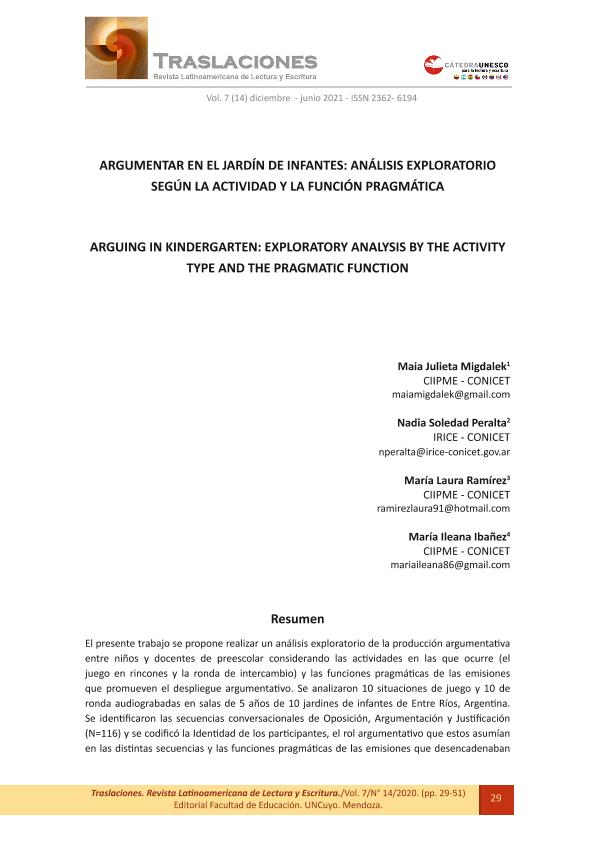Artículo
El presente trabajo se propone realizar un análisis exploratorio de la producción argumentativa entre niños y docentes de preescolar considerando las actividades en las que ocurre (el juego en rincones y la ronda de intercambio) y las funciones pragmáticas de las emisiones que promueven el despliegue argumentativo. Se analizaron 10 situaciones de juego y 10 de ronda audiograbadas en salas de 5 años de 10 jardines de infantes de Entre Ríos, Argentina. Se identificaron las secuencias conversacionales de Oposición, Argumentación y Justificación (N=116) y se codificó la Identidad de los participantes, el rol argumentativo que estos asumían en las distintas secuencias y las funciones pragmáticas de las emisiones que desencadenaban la presencia del argumento o justificación. Se realizó un análisis de correspondencias múltiples que arrojó tres agrupamientos: el primero vincula la Justificación con las funciones pragmáticas Directiva y Reporte, con un fuerte peso de la maestra en el despliegue de la misma; el segundo agrupa la argumentación con las funciones pragmáticas Pregunta y Comentario y al niño en rol de Oponente y presentando los argumentos; y finalmente, en el tercer agrupamiento, la Simple oposición con el niño como Proponente. Asimismo, el análisis estadístico se combinó con un análisis cualitativo que ejemplifica los agrupamientos identificados. Estos resultados ponen de manifiesto que tanto el juego y como la ronda son actividades igualmente propicias para el despliegue de argumentos y justificaciones. This study aims to carry out an exploratory analysis of argumentative production among preschool 5 year old children and kindergarten teachers by considering the type of the activity in which it occurs (play centers and circle time) and the pragmatic functions of the utterances that promote argumentative display. The corpus consists of 10 play situations and 10 circle time activities audio-recorded at 10 kindergartens in Entre Ríos, Argentina. We coded: 1) the Conversational sequences of Opposition, Argumentation and Justification (N = 116), 2) the Identity of the participants, 3) the Argumentative role they assumed in the different sequences, and 4) the Pragmatic functions of the utterance that triggered the presence of the argument or justification. A multiple correspondence analysis was carried out that yielded three clusters: the first one links Justification with the Directive and Reporting pragmatic functions, with a strong weight of the Teacher in the Argumentative role; the second groups the Argumentation with the Question and Comment pragmatic functions and a prominent role of the Child displaying the arguments. Finally, in the third cluster, the Simple opposition links with the Child as the Proponent. Likewise, the statistical analysis were combined with a qualitative analysis that exemplifies the identified groupings. These results show that both the play center and the circle time are equally conducive to the deployment of arguments and justifications.
Argumentar en el jardín de infantes: análisis exploratorio según la actividad y la función pragmática
Título:
Arguing in kindergarten: exploratory analysis by the activity type and the pragmatic function
Fecha de publicación:
11/2020
Editorial:
Universidad Nacional de Cuyo. Facultad de Educación
Revista:
Traslaciones
ISSN:
2362-6194
Idioma:
Español
Tipo de recurso:
Artículo publicado
Clasificación temática:
Resumen
Palabras clave:
ARGUMENTACIÓN
,
JARDÍN DE INFANTES
,
JUEGO
,
RONDA
,
FUNCIÓN PRAGMÁTICA
Archivos asociados
Licencia
Identificadores
Colecciones
Articulos(IRICE)
Articulos de INST.ROSARIO DE INVEST.EN CS.DE LA EDUC. (I)
Articulos de INST.ROSARIO DE INVEST.EN CS.DE LA EDUC. (I)
Citación
Migdalek, Maia Julieta; Peralta, Nadia Soledad; Ramírez, María Laura; Ibañez, María Ileana; Argumentar en el jardín de infantes: análisis exploratorio según la actividad y la función pragmática; Universidad Nacional de Cuyo. Facultad de Educación; Traslaciones; 7; 14; 11-2020; 29-51
Compartir
Altmétricas




